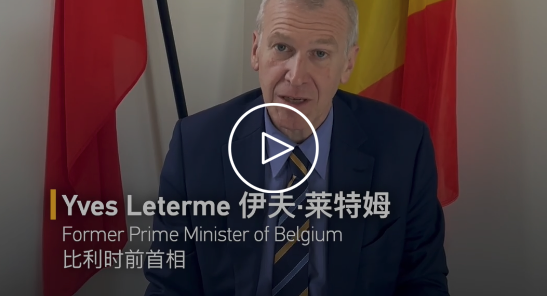Former Belgian Prime Minister shares View on “Understanding China”
Former Belgian prime minister Yves Leterme visited Shanghai during the opening of the CIIE in early November. Last week, a video where Yves Leterme describes his view on the Chinese economy and China’s unified national market emerged on Chinese broadcasting system “CGTN”.
“We are indeed currently living in the times of what is now called the polycrisis. Common to these crises is that they can only be countered, they can only be tackled and solved successfully through collective action, by joining forces. I strongly believe that economic and social progress, shared prosperity, more interconnected economies play a key role not only in improving the daily lives of people all over the globe, but that they can also decisively help to safeguard lasting peace.
My admiration goes to the opening of China re-engaging in the global economy, decided over 40 years ago, and of course, to the unprecedented economic and social progress that has been made since then, year after year, to the benefit of all Chinese citizens and to the benefit of the whole world. Amongst the key elements that led and still lead to this literally outstanding performance are the interpenetration and interconnection of the Chinese and other economies worldwide. This interpenetration and interconnection translated in increased foreign direct investment, in shared technological progress, more trade, mutualized access to export and import-markets, etc.
After opening up and re-entering history, China has over the last decades by means of its unprecedented successful economic and social development acted as the most important engine of worldwide economic growth and progress. Today, we witness however different events and actions that endanger the continuation of these beneficial dynamics.
We now indeed face a stagflation that does not seem ready to come to an end soon, at least not in most of the mature economies. Meanwhile, the measures needed to counter inflation unavoidably bring closer the risk for widespread recession which we all hope to be as short as possible.
In the midst of these trends, it is noteworthy that the 14th Five-Year Plan refers to a "dual circulation" development strategy where domestic consumption plays a leading role while international trade and investment remains its extension and supplement.
The concept of "dual circulation" translates in the policy goal of realizing the unification of the Chinese national market by tackling standardization and regulatory issues, local and provincial protectionism.
A successful realization of the united, unified national market will certainly contribute to the objective of bringing the GDP per capita at the level of moderately developed countries and expanding in a significant way the Chinese society's middle-income group. Creating a China-wide level playing field will allow Chinese companies even more competitive, including in the most advanced technologies and services. I am also convinced that the creation of the united national market in China brings new potential for global business-to-business trade, which is much less globalized than the consumer market.
Opening up, creating fair level playing fields, integrating markets, fair competition, promoting trade and exchanges are only possible with the underpinning of a strong rules-based multilateral system. And it is clear that the multilateralism as it was engineered at the end of World War II is now under pressure. It is indeed at the brink of a deep crisis at a moment when we so much need deepening the global cooperation.
And trust comes by foot and leaves by horse. And that trust is needed to make a successful review and strengthening of multilateralism possible. We have seen that in different regions of the globe, progress has been made recently in terms of integration and cooperation. It is important now, for the next months and years, to create the new momentum as a global community to take up the completion of the SDGs and to work at strengthening the global multilateral institutions. Only by doing so we can create real community with a shared future for mankind.
President Xi Jinping has in the recent past several times strongly expressed his willingness to contribute to strengthening again true multilateralism. Let us hope this can become reality and can open the way for a more balanced world, and make an efficient answer to the global challenges possible.”


